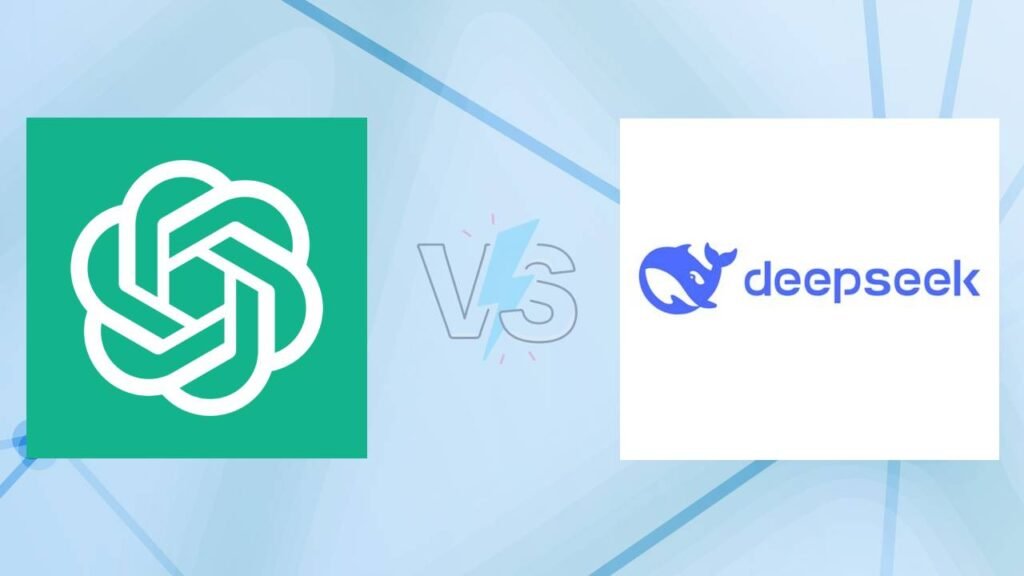ChatGPT vs DeepSeek: Key Differences, Features, and Use Cases Compared

Artificial intelligence has revolutionized how we interact with technology, and conversational AI tools like ChatGPT and DeepSeek are at the forefront of this transformation. But with so many options available, how do you choose the right tool for your needs? In the comparison of ChatGPT vs DeepSeek, whether you’re a business owner looking to automate customer service, a developer building AI-powered applications, or simply curious about the latest advancements in AI, understanding the differences between these two tools is crucial.
In this comprehensive guide, we’ll dive deep into the key differences, features, and use cases of ChatGPT and DeepSeek. By the end, you’ll have a clear understanding of which tool aligns best with your goals—and why.
Table of Contents
Why Does Choosing the Right AI Matter?
Before we compare ChatGPT and DeepSeek, let’s address the elephant in the room: why does it even matter? The answer lies in the unique capabilities and limitations of each tool. Choosing the wrong AI can lead to inefficiencies, missed opportunities, and even frustrated users.
For instance, a study by Gartner predicts that by 2025, 80% of customer service interactions will be handled by AI. But not all AI tools are created equal. Some excel at natural language understanding, while others prioritize speed or customization. Understanding these nuances can make or break your AI implementation.
ChatGPT: The Versatile Conversationalist
Developed by OpenAI, ChatGPT is one of the most widely recognized conversational AI models. Built on the GPT (Generative Pre-trained Transformer) architecture, it’s designed to generate human-like text based on the input it receives.
Key Features
- Natural Language Processing (NLP): ChatGPT excels at understanding and generating text that feels natural and conversational.
- Versatility: It can handle a wide range of tasks, from answering questions to writing essays, coding, and even creative storytelling.
- Pre-trained Models: OpenAI offers pre-trained models like GPT-3.5 and GPT-4, which require minimal fine-tuning for specific use cases.
- API Integration: Developers can easily integrate ChatGPT into applications using OpenAI’s API.
Use Cases
- Customer Support: Automating responses to common customer queries.
- Content Creation: Generating blog posts, social media captions, and marketing copy.
- Education: Assisting students with homework or providing explanations for complex topics.
- Programming: Writing and debugging code snippets.
Strengths
- Ease of Use: ChatGPT’s user-friendly interface makes it accessible to non-technical users.
- Broad Applicability: Its versatility makes it suitable for a wide range of industries and tasks.
Limitations
- Cost: Access to advanced models like GPT-4 can be expensive for small businesses.
- Contextual Understanding: While impressive, ChatGPT sometimes struggles with maintaining context in long conversations.
DeepSeek: The Niche Powerhouse
DeepSeek is a lesser-known but highly specialized AI tool designed for specific use cases. Unlike ChatGPT, which aims to be a jack-of-all-trades, DeepSeek focuses on delivering tailored solutions for industries like healthcare, finance, and legal services.
Key Features
- Domain-Specific Expertise: DeepSeek is trained on industry-specific datasets, making it highly accurate in specialized fields.
- Customization: Users can fine-tune the model to align with their unique requirements.
- Data Security: DeepSeek prioritizes data privacy, making it a preferred choice for industries handling sensitive information.
- Real-Time Processing: It’s optimized for low-latency applications, ensuring quick responses in time-sensitive scenarios.
Use Cases
- Healthcare: Assisting doctors with medical diagnoses and patient management.
- Finance: Analyzing market trends and providing investment recommendations.
- Legal Services: Drafting contracts and summarizing case law.
- Research: Accelerating data analysis in scientific studies.
Strengths
- Accuracy: DeepSeek’s domain-specific training ensures high accuracy in specialized tasks.
- Security: Its robust data protection measures make it ideal for sensitive applications.
Limitations
- Narrow Focus: DeepSeek’s specialization can be a drawback for users seeking a more general-purpose tool.
- Learning Curve: Customizing the model requires technical expertise, which may deter non-technical users.
ChatGPT vs DeepSeek: Key Differences
| Feature | ChatGPT | DeepSeek |
|---|---|---|
| Primary Focus | General-purpose conversational AI | Domain-specific AI solutions |
| Ease of Use | User-friendly, minimal setup | Requires technical expertise |
| Customization | Limited fine-tuning options | Highly customizable |
| Data Security | Standard encryption | Advanced data protection measures |
| Cost | Higher for advanced models | Varies based on customization |
| Use Cases | Broad and versatile | Niche and specialized |
Real-World Examples
ChatGPT in Action
A mid-sized e-commerce company integrated ChatGPT into its customer service platform. The AI handled 70% of customer inquiries, reducing response times from 24 hours to just minutes. This not only improved customer satisfaction but also freed up human agents to tackle more complex issues.
DeepSeek in Action
A healthcare provider used DeepSeek to analyze patient data and identify potential health risks. The AI’s ability to process medical records and provide actionable insights helped doctors make faster, more accurate diagnoses, ultimately improving patient outcomes.
Which Tool Should You Choose?
Selecting between ChatGPT and DeepSeek hinges on your unique requirements and objectives.
- Choose ChatGPT if:
- You need a versatile, general-purpose AI.
- You want an easy-to-use solution with minimal setup.
- Your use cases span multiple industries or tasks.
- Choose DeepSeek if:
- You operate in a specialized industry like healthcare or finance.
- You require high levels of customization and data security.
- You have the technical expertise to fine-tune the model.
FAQs
1. Can ChatGPT and DeepSeek be used together?
Absolutely! Combining ChatGPT’s versatility with DeepSeek’s specialization can create a powerful AI ecosystem. For example, you could use ChatGPT for general customer interactions and DeepSeek for handling industry-specific queries.
2. Which tool is more cost-effective?
Costs vary based on usage and customization. ChatGPT’s pricing is more transparent, while DeepSeek’s costs depend on the level of customization required.
3. Is DeepSeek better than ChatGPT?
Not necessarily. It’s about finding the right tool for your needs. DeepSeek excels in specialized tasks, while ChatGPT is better suited for general-purpose applications.
4. How do I get started with these tools?
For ChatGPT, visit OpenAI’s website and explore their API documentation. For DeepSeek, reach out to their team for a customized solution tailored to your industry.
Conclusion
Both ChatGPT and DeepSeek offer unique strengths that cater to different needs. ChatGPT is your go-to for versatility and ease of use, while DeepSeek shines in specialized, high-stakes environments. By understanding their key differences, features, and use cases, you can make an informed decision that aligns with your goals.
So, which tool will you choose? Share your thoughts in the comments below, or explore our related resources to dive deeper into the world of conversational AI at JSUpskills. The future of AI is here—make sure you’re equipped to harness its full potential!

 Install jsUpskills app on your home screen!
Install jsUpskills app on your home screen!